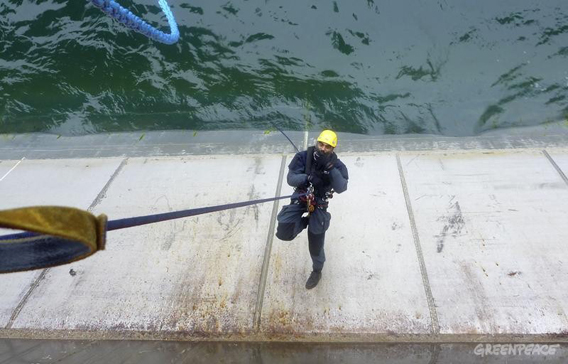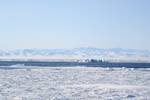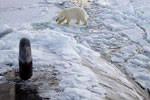UPDATE: After failing to slow down Gazprom by occupying its oil rig, Greenpeace is trying a different tact: activists have now attached their boat to a Gazprom passenger vessel preventing workers from reaching the oil rig and forcing an ongoing delay in operations.

Kumi Naidoo, head of Greenpeace, scaling a Gazprom oil platform for drilling in the Arctic Ocean. Photo © Greenpeace/Basil Tsimoyianis.
On Friday the head of Greenpeace, Kumi Naidoo, and five other activists occupied an Arctic oil platform owned by Russian oil and gas giant Gazprom to protest exploiting fossil fuel beds in the Arctic ocean. The action by Greenpeace was short-lived after workers began spraying them with cold water from high-powered hoses and then threw pieces of metal down at them, according to Naidoo, who communicated via Twitter during the civil disobedience.
“This threat affects us all. In my home country of South Africa we are now facing a far more dangerous climate because companies like Gazprom and Shell are pumping money into politics and blocking clean alternatives so that they can extract the last drops of oil left,” Naidoo said after scaling the oil platform in Russia’s Pechora Sea. As a youth, Naidoo protested against apartheid in his home country.
“We’re here in the Arctic to draw a line in the ice and say ‘you come no further,'” he added. The activists said they had supplies to last several days, but abandoned the occupation on Friday evening when workers began throwing metals. The organization told The Moscow Times that “multiple pieces of sharp, rusted jagged pieces of metal were thrown at the activists from above” including one large piece that was swung on a rope. To date the company has not confirmed or denied Greenpeace’s account, but stated that operations were not stalled due to Greenpeace’s actions.
The action came as a part of Greenpeace’s Save the Arctic campaign, which is targeting oil companies like Gazprom and Shell. For its part, Shell may begin off-shore drilling in the American Arctic in a couple months time if final permits are granted.
Greenpeace is protesting the opening up of the Arctic for two major reasons: climate change and oil spills. The organization says that neither Gazprom nor Shell have an effective plan for dealing with a major oil spill in the remote and mercurial Arctic. Recently, the organization alleged that Gazprom’s oil spill response plan was actually expired.
Despite such concerns from Greenpeace and many other environmentalists, governments are pushing aggressive exploitation. While most Arctic governments see recent ice loss in the region due to global warming as an opportunity to exploit long-inaccessible, but rich fossil fuel deposits, Greenpeace views the ice loss as a warning of what fossil fuel-driven climate change has already wrought.
Sea ice loss in the Arctic has been surpassing even the gloomiest predictions by scientists. This season will likely set another record low, and some researchers now say the Arctic could be ice free within a decade or two, an event that probably hasn’t occurred in over two million years and could have major repercussions on global weather systems.
Over one-and-a-half million people have signed Greenpeace’s demand to establish a global sanctuary in the Arctic, much like what has been established in the Antarctic.
Related articles
Arctic sea ice approaches another record melt
(08/22/2012) Sea ice extent in the Arctic is very near to beating the previous record low set in 2007, according to the U.S. National Snow and Ice Data Center. Researchers told Reuters that they expect the record to be beaten by the end of month, well over a week before the melt season ends in the frozen north.
Shell running out of time to drill in U.S. Arctic – this year
(08/20/2012) The clock is running out for oil giant, Royal Dutch Shell, to drill controversial oil wells in the U.S. Arctic before the harsh winter sets in, reports the Wall Street Journal and Bloomberg. While the company is still optimistic it can reach the Arctic by summer’s end, it awaits a number of final permits after suffering numerous setbacks, including one of its drilling ships going adrift and nearly running aground in Alaska.
(08/16/2012) Four weeks before Greenland’s melting season usually ends, it has already blown past all previous records. By August 8th, nearly a month before cooler weather usually sets in around the world’s largest island, the island toppled the past record set in 2010.
Greenpeace activists occupy icebreaker set for Arctic drilling
(05/01/2012) Greenpeace has announced that 20 of its activists, stemming from 13 countries, have locked themselves in an icebreaker ship in Helsinki, Finland. The ship is scheduled to move out to the Alaskan Arctic to aid in exploratory offshore drilling by oil giant Shell. Another icebreaker has already left for the U.S. Arctic; both have been leased to Shell by their owner, the Finnish government.
Obama Administration, Shell moving ahead with Arctic oil exploitation

(04/02/2012) Last week, the U.S. Department of the Interior approved oil spill clean-up plans by Royal Dutch Shell Oil in the Beaufort Sea, paving the way for offshore oil drilling in the Arctic to begin as soon this year. The Interior’s approval was blasted by environmentalists, who contend that oil companies have no viable way of dealing with a spill in the icy, hazardous conditions of the Arctic, far from large-scale infrastructure. Shell, which has spent $4 billion to date to gain access to the Arctic, must still be granted final permits for drilling.
Arctic warms to highest level yet as researchers fear tipping points

(02/13/2012) Last year the Arctic, which is warming faster than anywhere else on Earth due to global climate change, experienced its warmest twelve months yet. According to recent data by NASA, average Arctic temperatures in 2011 were 2.28 degrees Celsius (4.1 degrees Fahrenheit) above those recorded from 1951-1980. As the Arctic warms, imperiling its biodiversity and indigenous people, researchers are increasingly concerned that the region will hit climatic tipping points that could severely impact the rest of the world. A recent commentary in Nature Climate Change highlighted a number of tipping points that keep scientists awake at night.
Opposition rising against U.S. Arctic drilling
(02/09/2012) Drilling in the Arctic waters of the U.S. may become as contested an issue as the Keystone Pipeline XL in up-coming months. Scientists, congress members, and ordinary Americans have all come out in large numbers against the Obama Administration’s leases for exploratory drilling in the Beaufort Sea and the Chuckchi Sea.







